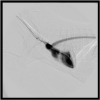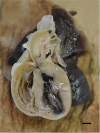This article has been
cited by other articles in ScienceCentral.
Abstract
A rare case of an unruptured sinus of Valsalva aneurysm (SVA) in a 2-month-old male Maltese terrier weighing 1.0 kg with a heart murmur is presented. A right SVA and a ventricular septal defect (VSD) were diagnosed by echocardiography and cardiac catheterization. The dog died due to a worsening of his condition. The necropsy revealed the sinus of Valsalva to have a diameter of 7 mm and a VSD hole was on the opposite surface. This report is the first to describe an unruptured SVA in the right coronary cusp of a small dog.
Keywords: Congenital heart defect, dog, sinus of Valsalva, ventricular septal defect
Sinus of Valsalva aneurysm (SVA) is a relatively rare heart disease in humans that is often congenital [
1]. Overall, the disease accounts for 0.6% of congenital heart abnormalities [
2]. Interestingly, it occurs most often in the right coronary cusp and least often in the left coronary cusp [
34]. SVA is more common in men [
5] and in the Asian population [
67]. Furthermore, it frequently involves a ventricular septal defect (VSD), aortic regurgitation, and pulmonary artery stenosis. The normal diameter of the sinus of Valsalva is 4.0 cm for men and 3.6 cm or less for women [
8]; this reference value is useful for diagnosing SVA in humans. Although SVA seldom presents with clinical symptoms before rupturing, a thrombus can form quickly within the aneurysm [
9], leading to fatal heart failure when it ruptures [
10]. Therefore, treatment is recommended even before rupture [
11].
Kleine et al. [
12] first reported a ruptured SVA in a dog in 1966. Since then, there have been some cases of rupture [
1314] and a report of a giant unruptured aneurysm with a thrombus [
15], but knowledge of this condition is quite limited. Moreover, there is also no prescribed reference size for the sinus of Valsalva in dogs, and no criteria exist for diagnosing SVA.
The present case was diagnosed with an unruptured right SVA due to a suspected displacement and dilation of the sinus of Valsalva accompanied by a VSD on echocardiography and a dilation of the right sinus of Valsalva on cardiac catheterization. As the present case was a juvenile small breed of dog, weighing 1.0 kg, follow-up observations were chosen because open-heart surgery with a cardiopulmonary bypass would be too risky. After the dog died, the necropsy also confirmed the dilated sinus of Valsalva.
A 2-month-old male Maltese terrier weighing 1.0 kg was found to have a heart murmur by a home veterinarian and was brought to the authors' hospital for examination (day 1).
His general condition at the first examination was favorable; he was active, had a healthy appetite, and had no respiratory problems. He had a heart rate of 184 bpm, respiratory rate of 24/min, and body temperature of 38.8°C. The visible mucous membrane was pink, and the femoral artery pressure was normal. The systolic blood pressure/diastolic blood pressure (mean arterial pressure) was 138/107 (120) mmHg. Upon auscultation, a Levine 4/6 systolic heart murmur was heard that was loudest at the base of the heart. An electrocardiographic examination revealed sinus rhythm and no arrhythmias. The chest X-ray did not show any abnormalities in the lung field, and the dog had a vertebral heart size of 9.0 and a cardiothoracic ratio of 72.0%.
The right parasternal/left ventricular outflow tract transaxial section and short-axis view on echocardiography revealed a VSD (flow rate 3.6 m/s) near where the aortic valve attaches to the anterior wall of the aorta (AO), as well as the right sinus of Valsalva at a location that covered the defect hole (
Fig. 1). Cardiac catheterization was planned with a provisional diagnosis of VSD with a displacement of the sinus of Valsalva.
On day 15, cardiac catheterization was conducted. Anesthesia was induced with atropine (0.05 mg/kg, subcutaneous injection), ampicillin (Ampicillin sodium injection 1 g; Kyoritsu Seiyaku Corporation, Japan) (30 mg/kg, intravenous injection [iv]), butorphanol (Vetorphale; Meiji Seika Pharma, Japan) (0.2 mg/kg, iv), midazolam (Dormicum injection 10 mg; Astellas Pharma, Japan) (0.2 mg/kg, iv), and propofol (Mylan injection 1%; Mylan, Japan) (to effect, iv). Anesthesia was maintained with isoflurane (isoflurane for animals; Intervet K.K., Japan) (1.5–2.2%). Under X-ray fluoroscopic guidance, a 0.018 guide wire and a multipurpose angled catheter (Goodtec angiographic catheter; Goodman, Japan) were inserted from the left common carotid artery, and an iodine-based contrast agent (Oypalomin 300; Konica Minolta Japan, Japan) was injected into the left ventricle (LC), AO, and right ventricle (RC). Contrast enhancement from the LC revealed a dilated right sinus of Valsalva (
Fig. 2). The RC was not enhanced distinctly through the defect hole, and the ventral side of the right sinus of Valsalva was enhanced only slightly.
This procedure gave a diagnosis of a right sinus of SVA accompanied by a VSD. The wound was closed using the standard method, and the dog recovered from anesthesia uneventfully. Unfortunately, the dog died due to a worsening of his condition, and a necropsy was performed. After the heart and lungs were fixed in formalin, the left ventricular outflow tract was opened, showing that the sinus of Valsalva had a 7 mm diameter and a VSD defect hole on its opposite surface (
Fig. 3).
The present case was confirmed to have a VSD by cardiac ultrasound on day 1. On the other hand, contrast enhancement of the LC during cardiac catheterization on day 15 revealed no enhancement of the RC through the defect hole, and the ventral side of the right sinus of Valsalva was enhanced only slightly. This finding suggested that the VSD hole had been covered by a dilation of the sinus of Valsalva, possibly weakening the shunt from the LC to the RC.
In dogs, the disease affects males almost exclusively, including the present case. Many studies have reported involvement of the left coronary cusp in larger dogs [
131415]. This report is the first to describe an unruptured SVA in the right coronary cusp of a Maltese terrier dog. SVA occurs rarely, making it difficult to accumulate data, but as observed with humans, the disease appears to affect males more often than females in large and small breeds of dogs.
Figures and Tables
Fig. 1
Echocardiography on day 1. Echocardiography revealed a ventricular septal defect near the attachment of aortic valve to the anterior wall of the AO, as well as the right sinus of Valsalva at a location that covered the defect hole. (A) Right parasternal left ventricular inflow outflow view. (B) Short-axis view.
LV, left ventricle; LA, left atrial; AO, aorta; NC, negative control; RC, responder control; LC, left coronary; RV, right ventricle.

Fig. 2
Fluoroscopic image on day 15. Contrast enhancement from the left ventricle revealed a dilated right sinus of Valsalva. The right ventricle was not enhanced distinctly through the defect hole.

Fig. 3
Necropsy imaging. The left ventricular outflow tract was opened, and the sinus of Valsalva was found to have a diameter of 7 mm (bar = 5 mm).

ACKNOWLEDGMENTS
The authors would like to thank all past and present members of our laboratory.
References
1. Ring WS. Congenital Heart Surgery Nomenclature and Database Project: aortic aneurysm, sinus of Valsalva aneurysm, and aortic dissection. Ann Thorac Surg. 2000; 69:S147–S163.

2. Yoda M, Nonoyama M, Shimakura T, Morishita A, Takasaki T. Surgical case of aortic root and thoracic aortic aneurysm after the Wheat procedure. Ann Thorac Cardiovasc Surg. 2002; 8:115–118.
3. Cheng TO. About sinus of Valsalva aneurysm. J Cardiovasc Surg (Torino). 2000; 41:647.
4. Chu SH, Hung CR, How SS, Chang H, Wang SS, Tsai CH, Liau CS, Tseng CD, Tseng YZ, Lee YT. Ruptured aneurysms of the sinus of Valsalva in Oriental patients. J Thorac Cardiovasc Surg. 1990; 99:288–298.

5. Dong C, Wu QY, Tang Y. Ruptured sinus of Valsalva aneurysm: a Beijing experience. Ann Thorac Surg. 2002; 74:1621–1624.

6. Murashita T, Kubota T, Kamikubo Y, Shiiya N, Yasuda K. Long-term results of aortic valve regurgitation after repair of ruptured sinus of Valsalva aneurysm. Ann Thorac Surg. 2002; 73:1466–1471.

7. Zikri MA, Stewart RW, Cosgrove DM. Surgical correction for sinus of Valsalva aneurysm. J Cardiovasc Surg (Torino). 1999; 40:787–791.
8. Troupis JM, Nasis A, Pasricha S, Patel M, Ellims AH, Seneviratne S. Sinus Valsalva aneurysm on cardiac CT angiography: assessment and detection. J Med Imaging Radiat Oncol. 2013; 57:444–447.

9. Umeda H, Isotani A, Arita T, Kudo T, Matsunaga T, Otsuji Y, Hanyu M. Rapid growth of thrombus formation in the unruptured sinus of Valsalva aneurysm following coronary angiography. J Echocardiogr. 2018; 16:182–184.

10. Lillehei CW, Stanley P, Varco RL. Surgical treatment of ruptured aneurysms of the sinus of Valsalva. Ann Surg. 1957; 146:459–472.

11. Naka Y, Kadoba K, Ohtake S, Sawa Y, Hirata N, Nishimura M, Matuda H. The long-term outcome of a surgical repair of sinus of Valsalva aneurysm. Ann Thorac Surg. 2000; 70:727–729.

12. Kleine LJ, Bisgard GE, Lewis RE. Rupture of the aortic sinus and aortic insufficiency in a dog. J Am Vet Med Assoc. 1966; 149:1050–1055.
13. Abbott JA, Porzio P. Rupture of the left aortic sinus into the pulmonary artery in a Dalmation dog. Vet Radiol Ultrasound. 1998; 39:544–550.
14. Solano M. Rupture of the left aortic sinus into the pulmonary artery in a Dalmatian dog. Vet Radiol Ultrasound. 1999; 40:103.
15. Jandrey KE, Smarick SD, Burkitt JM, Labelle P, Mohr FC, Kittleson MD. Giant unruptured aneurysm of the left sinus of Valsalva in the left ventricular outflow tract of a young dog. J Vet Intern Med. 2005; 19:602–605.






 PDF
PDF Citation
Citation Print
Print





 XML Download
XML Download